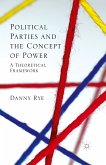Party conferences are central to the life of political parties. They contribute to setting policy agendas, developing policy options, legitimizing policy choices, building party cohesion, motivating activists and publicizing party activities to the wider public. An analysis of their evolution in Britain helps us understand the ways in which political parties change. This book combines anthropological methods with political science to analyze changing power relationships, party organizations and political culture in British political parties: Labour, Conservative, Liberal Democrats, The Greens.
' Changing parties is a welcome in-depth study of the transformation of the British party conferences...This is a thoroughly-researched book which provides a welcome insight into the transformation of these annual seaside gatherings and the changes within British political parties in the 1990s; it is a welcome addition to the study of political parties and more generally to British political ethnography'. - James Stanyer, Political Studies Review









